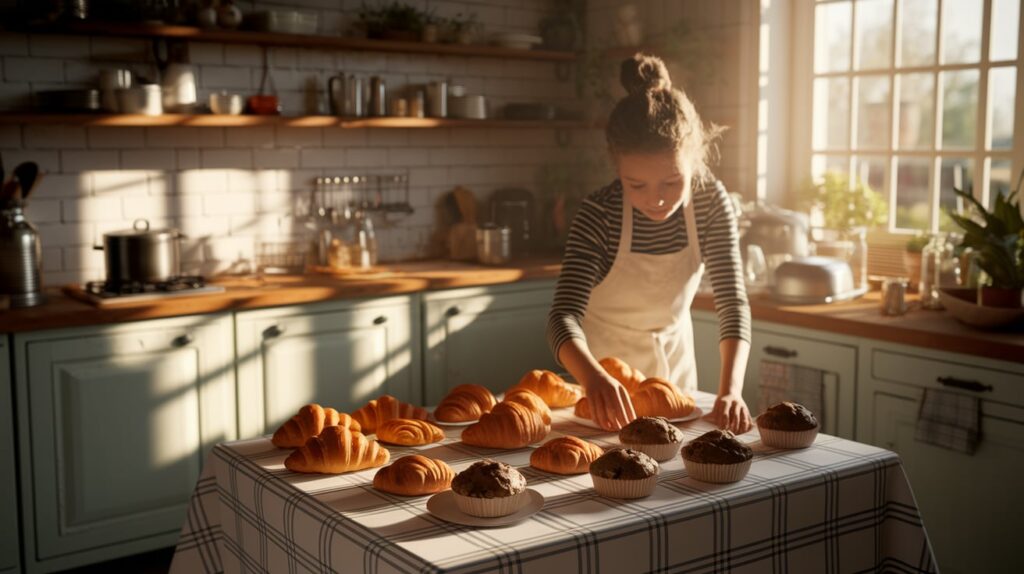Imagine waking up every morning to the delightful aroma of freshly baked bread or the sweet scent of cookies just out of the oven. If baking is your passion and you’re dreaming about turning it into a profitable venture, starting a baking business at home might be the perfect recipe for success.
This isn’t just about making dough; it’s about crafting a life you love, on your own terms. You might be wondering where to start, what steps to take, and how to ensure your delicious creations stand out in a crowded market.
Fear not, because in this guide, you’ll discover the essential ingredients needed to launch your home-based baking business. From understanding regulations to marketing your mouth-watering treats, we’ve got you covered. So, grab your apron and let’s dive into the delectable world of home baking entrepreneurship. You’re just a few steps away from turning your kitchen into a thriving business hub. Keep reading, and let’s make your baking dreams rise to reality!

Starting a Baking Business at Home
Market Potential: The U.S. bakery market is valued at $130 billion, with demand for specialty items like gluten-free or vegan baked goods rising.
Steps to Start:
- Find a Niche: Focus on unique offerings like artisanal sourdough, keto cupcakes, or custom wedding cakes to stand out. Research local bakeries to identify gaps (e.g., allergy-friendly pastries).
- Comply with Cottage Food Laws: Most states require a food handler’s permit and kitchen inspections. Label products with ingredients and allergens (e.g., “nut-free”). Check your state’s Department of Health website for specifics.
- Set Up Your Kitchen: Invest in commercial-grade equipment (e.g., stand mixer, baking sheets) and ensure a pet-free, sanitary workspace. Cost out recipes every 6 months to maintain profitability.
- Market Your Goods: Sell at farmers’ markets, local cafes, or online via a Shopify store. Use Instagram to showcase vibrant photos of your treats, offering giveaways to boost engagement.
- Unique Tip: Offer subscription boxes for weekly baked goods deliveries to build a loyal customer base.
Startup Costs: $1,000–$5,000 (equipment, ingredients, permits, branding). Legal Note: Some states limit annual sales for cottage food businesses (e.g., $50,000 in Texas). Verify limits to avoid penalties.
Market Research
Starting a baking business at home requires understanding your market. Identify your target customers and their preferences. Research competitors to find your unique selling point.
Starting a baking business at home is a delightful journey that can turn your passion for pastries into a profitable venture. However, before you whip up your first batch of cupcakes for sale, investing time in market research can set you on the right path. Understanding your market helps you find your niche, connect with your customers, and stand out in a crowded marketplace. Here’s how you can dive into market research effectively.
Identify Target Audience
Knowing your audience is like having a secret recipe for success. Start by asking who would buy your baked goods. Are they busy moms looking for healthy snacks for their kids? Or perhaps college students wanting affordable treats?
Consider the preferences and habits of your ideal customers. Do they value organic ingredients or prefer trendy flavors? You could even conduct a small survey among friends or family to gather insights. These questions help you tailor your offerings to meet their needs.
Analyze Competitors
In the world of baking, competition is fierce. Studying your competitors gives you a chance to find gaps and opportunities. Visit local bakeries and check out their menus. What are their best sellers? What pricing strategies do they use?
Also, look at their online presence. Are their social media pages active? Do they engage with customers through promotions or special events? By analyzing these aspects, you can learn what works and what doesn’t, allowing you to craft a unique selling proposition for your own business.
Market research might seem daunting, but it’s a crucial step in your baking business journey. Imagine yourself as a customer. What would make you choose one bakery over another? By understanding your audience and learning from competitors, you can serve up success along with your delicious creations.
Business Plan Essentials
Starting a baking business at home can be exciting. A strong business plan is crucial. It guides your efforts and helps secure funding. This section will discuss key elements of a business plan. We’ll look at defining business goals and outlining financial projections.
Define Business Goals
Start by outlining your business goals. What do you want to achieve? Are you aiming for local sales or online reach? Clear goals help you stay focused. They guide your decisions and track progress. Break down big goals into smaller, manageable steps. This makes them easier to achieve.
Outline Financial Projections
Financial projections show your business’s potential. They include expected income and expenses. Start with estimating startup costs. Consider ingredients, packaging, and marketing. Then, forecast your sales. How much do you expect to earn monthly? Be realistic but optimistic. Accurate projections attract investors and keep you on track.
Legal Requirements
Starting a home baking business involves understanding local health and safety regulations. Obtain permits and ensure compliance with zoning laws. Familiarize yourself with food safety standards to protect your customers.
Starting a baking business from home can be an exciting venture, especially if you have a passion for baking. However, it’s crucial to understand the legal requirements to ensure your business is both legitimate and successful. Navigating the legal landscape may seem daunting, but breaking it down into simple steps can make the process manageable and less overwhelming.
Register Your Business
Before selling your first batch of cookies, you need to register your business. This step is essential to establish your business legally and protect your brand.
Consider what name you want for your business. It should be unique and memorable, reflecting your baked goods’ charm.
Once you’ve decided on a name, check its availability. You can usually do this through your local government’s business registry or website.
After confirming the name, register it. This process can often be completed online, saving you time and hassle.
Understand Licensing And Permits
Understanding the necessary licenses and permits is crucial. They ensure your business meets health and safety standards.
Start by researching local health department regulations. These often cover requirements for home-based food businesses, such as kitchen inspections or food safety training.
You may need a general business license. This is usually required to operate legally in your area.
Some areas require specific permits for selling food. Ensure you have all the necessary documentation before opening.
Think about it—skipping these steps could lead to fines or business closure. Do you want to risk your dream because of overlooked paperwork?
By taking these steps, you’re not just following the law. You’re building a solid foundation for your home baking business, setting the stage for future growth and success.
Setting Up Your Kitchen
Organize your kitchen for a home baking business by setting up a clean, efficient workspace. Stock essential baking tools and ingredients within easy reach. Label storage containers for quick access and maintain a clutter-free environment to streamline your baking process.
Starting a baking business at home is an exciting venture that allows you to transform your passion into a profitable endeavor. However, before you whip up your first batch of cookies, it’s crucial to set up your kitchen efficiently. A well-organized kitchen not only enhances productivity but also ensures you can meet your customers’ needs promptly. Let’s delve into the essentials of setting up your kitchen for success.
Essential Baking Equipment
Begin by acquiring the right tools. A sturdy mixer is a baker’s best friend and can save you time and effort. Invest in quality baking pans of various sizes. These allow you to experiment with different recipes and cater to diverse customer requests.
Ensure your oven is reliable and accurate. Consider purchasing an oven thermometer to check its temperature consistency. You don’t want your cakes to come out unevenly baked.
Don’t forget smaller items like measuring cups, spoons, and spatulas. They are essential for precision and consistency in your baking.
Organizing Your Workspace
A clutter-free workspace is key to efficiency. Arrange your baking equipment within easy reach. Keep frequently used items, like mixing bowls and utensils, close to your prep area.
Utilize shelves and cabinets to store ingredients neatly. Label containers to avoid confusion during busy baking sessions. This saves time and keeps your workflow smooth.
Consider adding a small prep table. This dedicated space can be used for rolling dough or decorating cakes, keeping your main counter clean for other tasks.
Have you ever struggled to find the right tool in the middle of a baking rush? Organizing your workspace can eliminate such frustrations, letting you focus on creating delicious treats without distraction.
Setting up your kitchen well lays the foundation for a successful baking business. With the right equipment and a tidy workspace, you’re ready to turn your sweet dreams into reality.
Sourcing Ingredients
Starting a baking business at home involves many exciting steps. One essential aspect is sourcing the right ingredients. Quality ingredients make a significant difference in your baked goods. They ensure your products taste delicious and look appealing. Finding reliable suppliers and choosing the best ingredients are crucial tasks. These steps help maintain consistency and build a strong reputation.
Finding Reliable Suppliers
Begin by researching local and online suppliers. Look for those with positive reviews and a solid track record. Check if they offer the specific ingredients you need. Compare prices and delivery options. Some suppliers provide discounts for bulk purchases. Establish a good relationship with them. It can lead to better deals and priority service.
Choosing Quality Ingredients
Quality ingredients elevate your baked goods. Opt for organic or locally sourced options when possible. Freshness is key, so check expiration dates regularly. Choose flour, sugar, and other basics wisely. Consider the taste and texture they provide. Specialty items like chocolate and vanilla should be of high quality. They impact the final flavor significantly.
Creating A Product Line
Creating a product line is a crucial step when starting your baking business at home. It’s not just about choosing what to bake, but crafting a collection of items that tell your story and meet customer needs. A well-defined product line helps you stand out in the market and attract loyal customers.
Developing Signature Recipes
Signature recipes are the heart of your product line. They reflect your unique taste and skills. Think about the flavors and ingredients that excite you. Maybe it’s a unique twist on a classic chocolate chip cookie or a family secret apple pie recipe.
Start experimenting in your kitchen. Test different combinations and adjust them until you find the perfect balance. Share samples with friends and family for honest feedback. This process might take time, but it’s worth finding that one recipe people can’t resist.
What is your baking style? Are you classic, modern, or experimental? Find your niche and let it shine through your recipes. A distinct signature recipe will make your business memorable.
Pricing Your Products
Pricing is more than just numbers; it’s about understanding your costs and valuing your time. Calculate the cost of ingredients, packaging, and labor. Don’t forget utilities, marketing, and other expenses that add up.
Once you know your costs, set a price that gives you a reasonable profit. Research your competitors to ensure your prices are competitive yet profitable. Avoid the trap of underselling yourself.
Consider pricing strategies like bundle deals or seasonal specials. These can attract customers and increase sales. Remember, pricing is not static; adjust it based on feedback and changing market trends.
Creating a product line that resonates with your audience is both art and science. Have you thought about what will make your product line irresistible? Start with developing signature recipes and pricing strategies to lay a strong foundation for your baking business.
Marketing Strategies
Starting a baking business at home requires effective marketing strategies. These strategies help attract customers and grow your business. Understanding how to market effectively is crucial for success. This section covers key aspects of marketing, focusing on building an online presence and utilizing social media.
Building An Online Presence
Creating a website is essential for your baking business. It showcases your products and tells your story. Use simple design and easy navigation. Include high-quality images of your baked goods. Describe each item clearly and appealingly. Share your unique selling points. Highlight customer testimonials and reviews.
Optimize your website for search engines. Use relevant keywords related to baking. Make sure your site loads quickly. Ensure it is mobile-friendly. These factors improve your ranking on search engines. Good rankings help potential customers find you easily.
Utilizing Social Media
Social media is a powerful tool for marketing. Create accounts on popular platforms like Facebook and Instagram. Share engaging content regularly. Post photos of your latest creations. Share behind-the-scenes moments from your kitchen. Connect with your audience through comments and messages.
Utilize social media advertising to reach more people. Target specific demographics interested in baking. Share special offers and promotions. Collaborate with influencers in the food industry. These strategies increase visibility and attract new customers.
Consistency is key in social media marketing. Post regularly to maintain interest. Use clear and simple language. Engage actively with followers to build relationships. Social media helps create a community around your brand.
Sales Channels
Explore different sales channels for your home baking business. Sell through social media, online marketplaces, or local markets. These platforms help reach more customers and increase sales.
Starting a baking business at home comes with its own set of challenges and opportunities. One of the most critical aspects you’ll need to consider is how you plan to sell your delicious creations. Understanding and choosing the right sales channels can significantly impact your success. Let’s explore two effective ways to get your baked goods into the hands of customers.
Direct Sales To Customers
Reaching your customers directly can be a straightforward and rewarding approach. You can start by selling through social media platforms like Instagram or Facebook. These platforms allow you to showcase your baked goods with visually appealing photos and engage directly with potential buyers.
Consider setting up an online store or a simple website where customers can place orders. Platforms like Etsy or Shopify can help you with this. They provide user-friendly interfaces for setting up an online shop, making it easy for customers to browse and buy.
Another option is hosting pop-up events or participating in local markets. These provide great opportunities to connect with your community and get immediate feedback. Picture this: a customer tries your cupcake, loves it, and shares their experience with friends. That’s organic growth you can’t buy!
Partnering With Local Businesses
Collaborating with local businesses can open up new avenues for your baking business. Think about partnering with cafes, restaurants, or local grocery stores. These businesses often look for unique and high-quality baked goods to offer their customers.
Approach these businesses with samples of your products and a clear proposal. Explain how your baked goods can complement their offerings. You might be surprised at how many local shops are interested in featuring locally made products.
You could also consider teaming up with event planners or caterers. Your baked goods can be a hit at weddings, corporate events, and parties. This not only boosts your sales but also increases your exposure to a wider audience.
Choosing the right sales channels can make or break your home baking business. Have you thought about which channels align best with your products and goals? Whatever you choose, remember that each channel has its unique advantages.
Customer Service
Starting a baking business at home requires excellent customer service to build trust and loyalty. Listening to feedback helps improve products and meets customer needs. Always respond promptly to inquiries and concerns to create a positive experience.
Customer service is crucial for your home baking business. It builds trust and loyalty with customers. Great service sets you apart. It makes people come back for more. Happy customers spread the word. This leads to more orders and success.
Handling Orders And Deliveries
Managing orders efficiently is key. Keep track of all incoming requests. Use a system to organize them. This helps avoid mistakes. Timely deliveries show professionalism. Plan routes smartly. It saves time and satisfies customers. Confirm delivery times with clients. Clear communication prevents confusion. Ensure packaging is secure. Fresh products make a great impression.
Managing Customer Feedback
Feedback offers valuable insights. Listen to what your customers say. Address complaints promptly. It shows you care. Positive reviews boost your reputation. Encourage clients to share their thoughts. Use feedback to improve your service. It helps your business grow. Respond to all feedback respectfully. It builds a positive relationship. Keep improving based on customer suggestions.

Scaling Your Business
Starting a baking business at home involves planning and passion. Create delicious recipes that appeal to your local market. Ensure compliance with health regulations and build an online presence to attract customers.
Scaling Your Business
Starting a baking business at home can be an exciting journey. But what happens when your orders start piling up and your kitchen feels like it’s bursting at the seams? It’s time to scale your business. Scaling doesn’t just mean making more of the same; it involves strategic steps to ensure growth. As you think about scaling, consider how you can make your business more robust, efficient, and customer-friendly.
###
Expanding Product Range
One way to scale your business is by expanding your product range. Adding new items to your menu can attract more customers and keep existing ones interested. Think about seasonal offerings or themed products.
You might start with classic cookies and cupcakes but later introduce gluten-free options or vegan treats. Pay attention to customer feedback; it can guide you on what to add next.
Experimentation is key. Test new recipes in small batches before launching them. This ensures quality and helps you manage costs.
###
Hiring Additional Staff
As your orders grow, handling everything alone can become overwhelming. Hiring additional staff can ease the workload and improve efficiency. But how do you know when it’s time to hire?
If you find yourself working late nights or compromising on quality, it might be time to bring in help. Start with part-time assistants who can manage tasks like packaging or deliveries.
Training is crucial. Ensure new staff understand your standards and processes. This maintains consistency and keeps your customers satisfied.
Scaling a home baking business involves thoughtful planning and execution. What are your strategies for growth? Consider these steps to take your business to the next level.
Frequently Asked Questions
How Do I Start A Home Baking Business Legally?
To start legally, research local regulations and obtain necessary permits. Register your business and comply with health and safety standards. This might include kitchen inspections and obtaining food handling certifications. Keeping detailed records of expenses and income is essential for tax purposes.
Consult with a legal expert for tailored advice.
What Equipment Is Essential For Home Baking?
Essential equipment includes an oven, mixers, baking pans, and measuring tools. Invest in quality ingredients like flour, sugar, and butter. Storage containers are also important for keeping ingredients fresh. Depending on your products, specialized tools like pastry bags or cake molds might be needed.
Start small, then expand as your business grows.
How Can I Market My Home Baking Business?
Leverage social media platforms like Instagram and Facebook to showcase your baked goods. Create a website with an online ordering system for convenience. Attend local events and farmers’ markets to gain exposure. Encourage satisfied customers to leave reviews. Word of mouth and referrals are powerful tools for attracting new clients.
How Do I Price My Baked Goods?
Calculate the cost of ingredients, packaging, and time spent on each product. Factor in overhead costs like utilities and marketing. Research competitors’ pricing for similar products. Ensure your pricing reflects the quality and uniqueness of your items. Consider offering discounts for bulk orders or loyal customers to attract repeat business.
Conclusion
Starting a baking business at home is exciting. Take small steps to begin. Focus on your passion for baking. Learn as you go, adapt, and grow your skills. Keep an eye on trends and customer preferences. Quality ingredients and consistent flavors matter.
Build connections with your customers. Use social media to reach more people. Always aim for improvement and creativity. Enjoy the journey of baking. Every challenge brings new learning opportunities. Your kitchen can be your successful business hub. Stay committed, and success will follow.
Baking dreams can become a reality with dedication and hard work.








